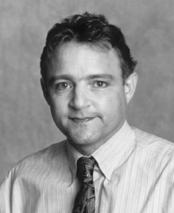

|
| Volume 48, Number 3, Fall 1999 |
by Joe Palca

|
|
|
For those of you who do make the pilgrimage, I think this year's NASW workshops will be among the best ever. First off, on Wednesday, February 16, we have an afternoon at the National Institutes of Health, in Bethesda. In addition to hearing from such bio-luminaries as National Cancer Institute Director Richard Klausner, National Human Genome Research Institute Director Francis Collins, and Thomas Cech, new head of the Howard Hughes Medical Institute, the program offers the chance to go behind the scenes at NIH, visit laboratories, and actually take a stab at wielding a pipette or running a gel. If you see Robin Marantz Henig or Bobbie Bennett during your visit, be sure to offer them a warm thank you for their efforts in organizing a terrific program.
After all that time sweating over a hot lab bench, we'll bus over to the nearby HHMI headquarters for a reception.
On Thursday, we switch over to the more standard workshop events, to be held at the AAAS meeting hotels. We'll kick off with what promises to be a splendid plenary session organized by Mary Knudson. Mary has rounded up a fascinating group of panelists to discuss what makes science news, and where the field of science writing is heading. After that comes a day of informative and relevant workshops on topics ranging from how the broadcast media cover science news to how to use copyright law to protect your work. Thanks to Deborah Blum, Carol Cruzan Morton, and the workshops committee for pulling the day together, and Paul Lowenberg for his usual outstanding organization work.
As you may remember, this year we'll be giving out the NASW Science in Society Prize at the NASW meeting. The actual award ceremony will be on Thursday afternoon, after the workshop program. We'll then have a reception hosted by AAAS.
Then, on Saturday, there's the NASW business meeting, where you can find out what I and the other officers of NASW really look like. It's a time for praising us with great praise, or hurling brickbats, whichever seems most appropriate.
The final NASW event is our banquet, which this year is more lavish reception than true banquet. We figured people were tired of rubber chicken, and in my experience caterers do better with finger food anyway. The event will be at the National Museum of Natural History, on the Mall. The evening should be festive indeed: AAAS is celebrating the 50th year of its journalism prize, now generously supported by the Whitaker Foundation, and as customary, the prize winners will receive their citations (and checks) at the banquet, excuse me, reception. We'll end the evening with an IMAX movie in the museum's brand-new 3D IMAX theater.
One other event that you'll not want to miss is the DCSWA party scheduled for Sunday night. The events hosted by the local science writers groups have frequently been the social highlight of the AAAS meeting, so if your travel plans give you the flexibility to hang around through the weekend, try to do so. I know this year's planning committee will be trying to eclipse the last DCSWA party, held at a dance club in the Adams Morgan neighborhood of Washington. That party, which revealed the shocking boogie talents of many of our members was, I say in all modesty, one of the best parties yet, even if as DCSWA president at the time I helped organize it.
Finally, speaking of local science-writing organizations, I've begun to wonder if there's a way of improving the connections between them and NASW. Not that relations are bad, but you'll note I called them "local science-writing organizations," not local chapters. That's because some local groups have taken pains to establish their own ways of doing things. For example, DCSWA has traditionally been open to all science writers (at least all science writers who could pay the $15 dues) without reference to any other descriptions that might apply, i.e. journalist, PIO, freelancer, what-have-you. In the early days of DCSWA, we were certainly not interested in being called a subsidiary of NASW-we saw ourselves as being more active than the stodgy, national organization. Now as president of that stodgy organization, I'd like to think of ways of making things more vertically integrated, as they say in the business world. I'd appreciate any thoughts on how that might be done.
Joe Palca can be reached at National Public Radio, 635 Massachusetts
Ave. NW, Washington, DC 20001; phone 202-414-2776, fax 202-414-3329,
e-mail jpalca@npr.org.